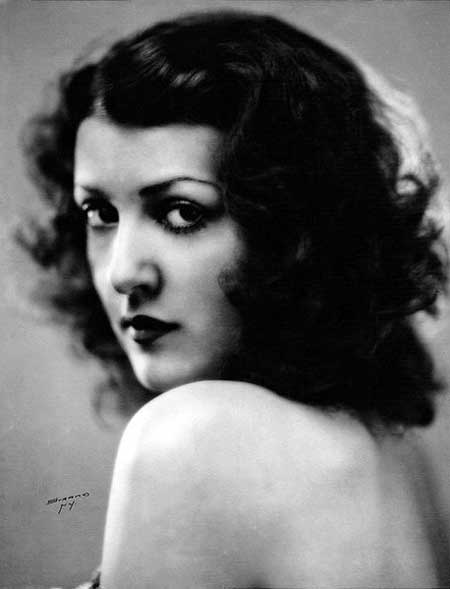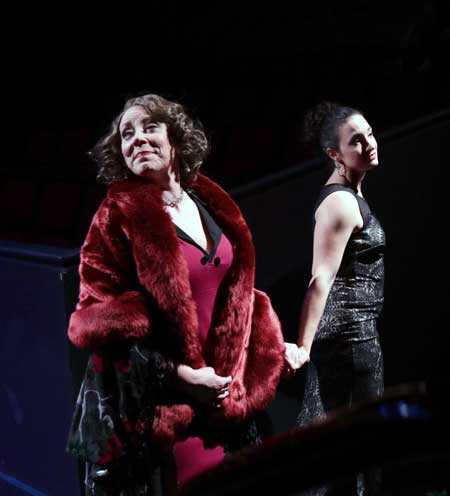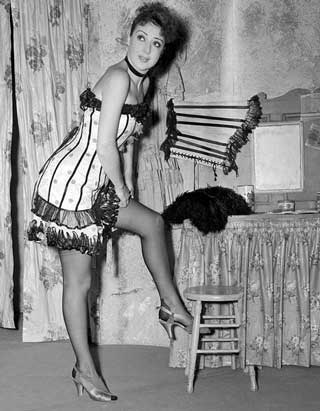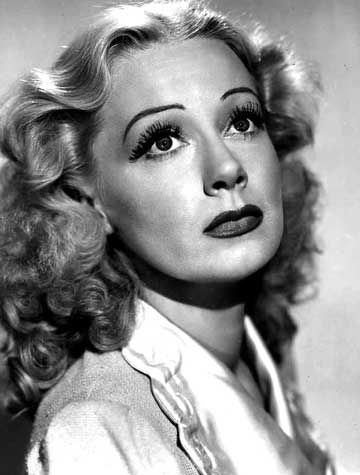Musical (1959)
Book by Arthur Laurents
Music by Jule Styne
Lyrics by Stephen Sondheim
Suggested by memoirs of Gypsy Rose Lee
Directed and Choreographed by Rached Bertone
Music Director: Dan Rodriguez
Lyric Stage Company of Boston
Copley Square area, Boston
September 1 – October 8, 2017
With Leigh Barrett (Rose), Kirsten Salpni (Louise), Kira Troilo (June), Steven Barkhimer (Herbie), Brady Miller (Tulsa), David Alea (Yonkers), Todd Yard (Uncle Jocko), Remo Airaldi (Pop), Kathy St. George (Mazeppa), Jordan Clark (Electra), Shannon Lee Jones (Tessie), Anna Chensyny (Agnes), Davron S. Monroe (Georgie), Margot Anderson-Song (Baby June), Cate Galante (Young Louise)

In the early 1920s, Rose (Leigh Barrett), a determined stage mother, drives her two young daughters, June Margot Anderson-Song) and Louise (Cate Galante), to the edge trying to make successful vaudeville careers for them. As the years wear on and the economy worsens and vaudeville begins to disappear, the possibilities thin out. Along the way she brings in Herbie (Steven Barkhimer) as agent and her not well-requited paramour. Ultimately, the theoretically talented daughter, now a young adult, June (Kira Troilo), finds her way elsewhere to leave the also young adult Louise (Kirsten Salpini), the more demure and less histrionic of the pair, to become, through her own ingenuity and her mother’s irresistible force, Gypsy Rose Lee.
There was a point at which this show, crafted in the late 1950s to suit Ethel Merman who played Rose in the original, might have had Stephen Sondheim as its composer as well as lyricist. However, Merman, disappointed by another young composer-lyricist in a previous outing, insisted that Jule Styne, an established composer of musicals, write the music even though Sondheim would still write the lyrics. The result is one of the classics of Broadway musical theater, with many hit tunes on its roster. Nonetheless, one wonders what Sondheim might have done with the music had he had the opportunity. When he did finally get the chance in the next go-around, he produced the classic A Funny Thing Happened On The Way To The Forum (1962), a great success in all kinds of ways.

Kirsten Salpini as Louise (Gypsy Rose Lee)
in “Gypsy”
Photo: Mark S. Howard
Courtesy of Lyric Stage Company of Boston
Gypsy, fifty-eight years down the road, seems both a complex and interesting classic abut at times somewhat dated. It gives its principal subject, the mad and determined mother character Rose, a largely uncomplimentary portrait while delivering at the same time a lot of great tunes that exhibit something positive about her energy and drive.
Even though there are a fair number of characters in the cast, the show really belongs to Rose, and Leigh Barrett, the seasoned and capable Boston-based actor, rises to the occasion admirably. Her Rose is forceful and outrageous but not without charm. Barrett manages to convey that power of personality while still not appearing completely awful as a mother. She does come close, but some of the writing, along with Barrett’s balanced performance, delivers, on balance, some sympathy for the tough woman who cannot find her own place in the world but tries to do it through her daughters.
Some of the writing seems, at times, these many years later, a bit stilted and weird. When, for example, Louise, as a young adult, starts out in burlesque and Herbie suddenly decides to alter the course of his life, career and relationships, it seems unrealistic and far too abrupt.

The book of the musical is almost all build-up to Gypsy Rose Lee’s success, which at times seems strange, but it is not really Gypsy Rose Lee’s story as much as it is her mother’s. There is a certain severe Mommie Dearest (Cristina Crawford’s harsh 1978 memoir about her mother, film star Joan Crawford) quality to this narrative, but, as noted above, it gets tempered by music and dance which makes her not seem so bad.
Everyone else in the cast is pretty much a support to Barrett’s Rose. Steven Barkhimer is a decent Herbie but seems at times a bit too formal and distant, which makes the abruptness of his final turn seem all the stranger.
Kirsten Salpini, as Louise, the future Gypsy Rose Lee, is innocent and demure, and when she decides to switch dramatic venues and becomes a stripper, takes on enough of that persona to make it seem plausible, though one wonders how a steamier transformation might have rendered the portrayal.

The four kids who play the young June, Louise and friends do a wonderful job.
The orchestra plays well, and at considerable length, particularly in the overture and the entr’acte. Singing overall is competent.
Choreography is quite good, especially in some parts – the tap dancing episode comes to mind. I did muse about what made the critics rave over the Jerome Robbins choreography in the original.
– BADMan
Leave a Reply